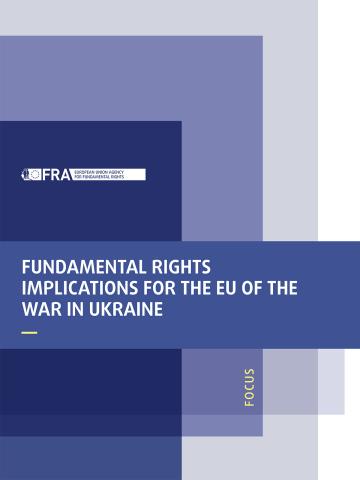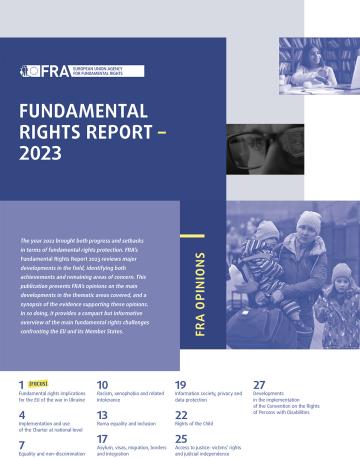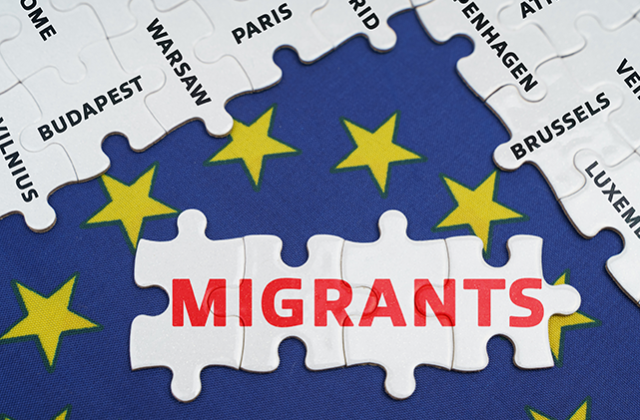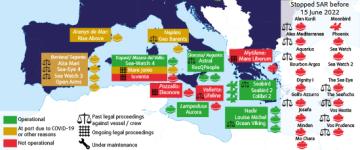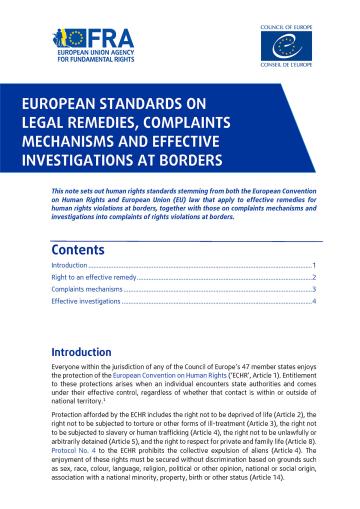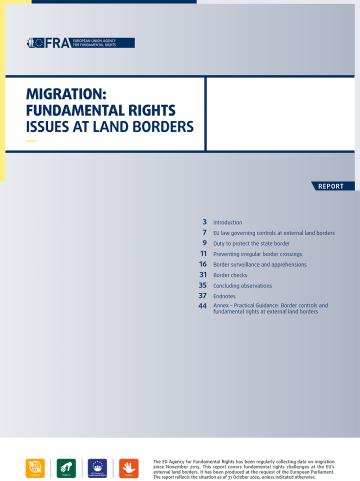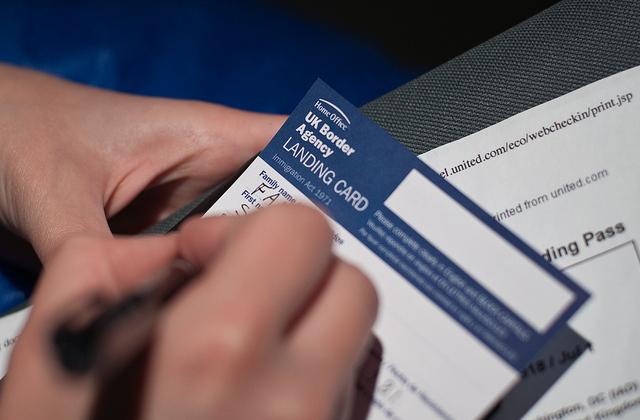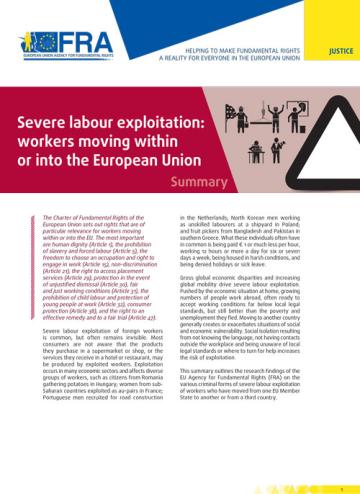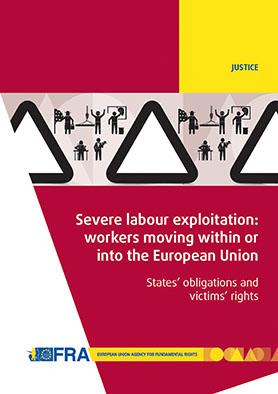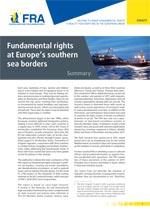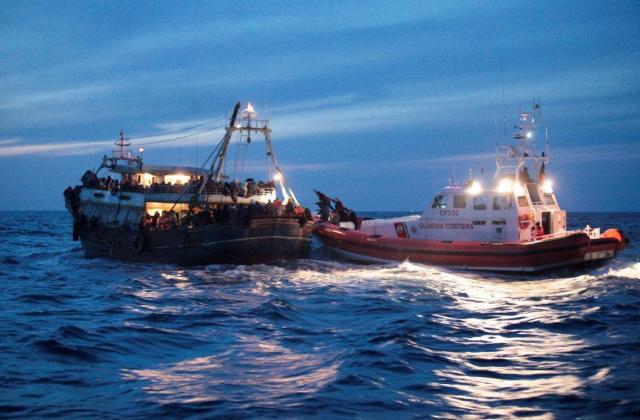4. Better protection of shipwreck survivors
Shipwrecks can be one of the most traumatic life experiences. [59]
United Nations, news, Helping migrant shipwreck survivors to deal with trauma, 26 March 2020.
Survivors witness tragedies, dramatic situations and loss of family members and friends. Shipwreck survivors have specific needs. They may need specialised help to deal with the traumatic experience and assistance in identifying missing family members. In addition, they have medical and psychological needs that must be responded to.
In most cases, shipwreck survivors are also victims of crime. Under Article 16 of the UN Protocol on Smuggling of Migrants, [60]
United Nations Treaty Series, vol. 2241, p. 507; Doc. A/55/383, Protocol against the Smuggling of Migrants by Land, Sea and Air, supplementing the United Nations Convention against Transnational Organized Crime, list of ratifications. All EU Member States except Ireland are party to the Protocol. The EU acceded the Protocol on 6 September 2006 (see Council Decision of 24 July 2006 (2006/616/EC) and Council Decision of 24 July 2006 (2006/617/EC)). Most Mediterranean costal states are also party to it.
to which all EU Member States except Ireland are Party, there is a clear obligation to protect the rights of smuggled migrants. Smuggling of migrants is a crime both under international law and EU law. [61]
Council Framework Decision 2002/946/JHA of 28 November 2002 on the strengthening of the penal framework to prevent the facilitation of unauthorised entry, transit and residence, OJ L 328, 5.12.2002, pp. 1-3, notably Art. 1.
As victims of crime, smuggled migrants are entitled to rights, support and protection as laid out in Directive 2012/29/EU. [62]
Directive 2012/29/EU of the European Parliament and of the Council of 25 October 2012 establishing minimum standards on the rights, support and protection of victims of crime, and replacing Council Framework Decision 2001/220/JHA, OJ L 315, 14 Nov. 2012, pp. 57–73.
This entails, for example, the right to be informed and to have access to victims’ support services.
There is a protection imperative to treat shipwreck survivors with human dignity, providing the necessary care, including psychosocial care, and allowing for the identification of deceased family members. EU asylum and return procedures need to take this into account.
Greek law explicitly listed persons with post-traumatic stress disorder, particularly shipwreck survivors and relatives of victims of shipwrecks, as one of the categories of vulnerable people. [63]
Art. 14 (8) of Law 4375/2016Organisation and functioning of the Asylum Service, Appeals Authority, Reception and Identification Service, establishment of General Secretariat for Reception, transposition of Directive 2013/32/EU of the European Parliament and of the Council ‘on common procedures for granting and withdrawing international protection (recast)’ (L 180/29.6.2013), provisions on employment of beneficiaries of international protection” and other provisions (Οργάνωση και λειτουργία Υπηρεσίας Ασύλου, Αρχής Προσφυγών, Υπηρεσίας Υποδοχής και Ταυτοποίησης σύσταση Γενικής Γραμματείας Υποδοχής, προσαρμογή της Ελληνικής Νομοθεσίας προς τις διατάξεις της Οδηγίας 2013/32/ΕΕ του Ευρωπαϊκού Κοινοβουλίου και του Συμβουλίου «σχετικά με τις κοινές διαδικασίες για τη χορήγηση και ανάκληση του καθεστώτος διεθνούς προστασίας (αναδιατύπωση)» (L 180/29.6.2013), διατάξεις για την εργασία δικαιούχων διεθνούς προστασίας και άλλες διατάξεις.), Government Gazette 51/A/3-4-2016.
Following legal amendments, only direct relatives of shipwreck victims are considered vulnerable persons with specific reception needs that require particular attention. [64]Art. 1 λγ of Law 4939/2022 ‘Ratification of the Code on reception, international protection of third-country nationals and stateless persons, and temporary protection in cases of mass influx of displaced persons’(Κύρωση Κώδικα Νομοθεσίας για την υποδοχή, τη διεθνή προστασία πολιτών τρίτων χωρών και ανιθαγενών και την προσωρινή προστασία σε περίπτωση μαζικής εισροής εκτοπισθέντων αλλοδαπών).
When visiting the reception facility in Malakasa, FRA observed that the Hellenic authorities gave priority and paid attention to the survivors of the Pylos shipwreck, also by involving the United Nations and civil society actors.
Under EU asylum law, there is an open-ended list of categories of people with specific needs. Shipwreck survivors are not excluded but are also not expressly mentioned. The non-exhaustive list of “vulnerable persons” in Article 21 of the Reception Conditions Directive mentions “minors, unaccompanied minors, disabled people, elderly people, pregnant women, single parents with minor children, victims of human trafficking, persons with serious illnesses, persons with mental disorders and persons who have been subjected to torture, rape or other serious forms of psychological, physical or sexual violence, such as victims of female genital mutilation”. A pending revision of the directive also includes “mental disorders including post-traumatic stress disorder” in such list. [65] Council of the European Union, Directive 2013/33/EU of the European Parliament and of the Council of 26 June 2013 laying down standards for the reception of applicants for international protection (recast) – Mandate for negotiations with the European Parliament, ST 15763 2022 INIT, 7 December 2022. The Return Directive (2008/115/EC) also contains a similar definition of ‘vulnerable persons’ in its Art. 3 (9).
Considering the number of shipwrecks, shipwreck survivors could be explicitly mentioned as a special category of people who need targeted support also in EU law. This would encourage all relevant actors to give more priority to this category of people. The EU Asylum Agency could, for example, develop guidance, including standards and indicators, and provide training for reception staff and asylum officers on how to work with shipwreck survivors. Frontex could complement this with considerations applying to return procedures.
Considering shipwreck survivors as applicants with special needs may also help facilitating survivors’ access to victim’s support services, protection and other rights victims of crime are entitled to under EU law including effective participation in criminal proceedings.
EU rules on asylum and return proposed as part of the Pact on Migration and Asylum [66]
European Commission (2020), Amended proposal for a Regulation establishing a common procedure for international protection in the Union and repealing Directive 2013/32/EU, COM(2020) 611 final, Brussels, 23 September 2020.
envisage that the asylum applications of people disembarked following a search and rescue operation of nationalities with a low likelihood to receive asylum would be processed at or near the border, usually in an accelerated manner. More specifically, following an agreement within the Council of the EU, which is now being negotiated with the European Parliament, asylum applicants from a third country for which the share of decisions granting international protection is lower than 20% of the total number of decisions for that third country will have to be examined through border procedures. [67] Council of the European Union, Amended proposal for a Regulation of the European Parliament and of the Council establishing a common procedure for international protection in the Union and repealing Directive 2013/32/EU, General approach, Council Doc. No. 10444/23, Brussels, 13 June 2023, Art. 41b. See also its Recital (39a), Recital (40b), Art. 40 (1) (i) and Art. 40 (5) (c) for unaccompanied children.
An express recognition of shipwreck survivors as a category of asylum applicants with special needs would facilitate the application of the safeguards envisaged in the proposed EU rules, which provide, for example, for not applying border procedures in case the specific support the person needs cannot be provided there. [68]
European Commission (2020), Amended proposal for a Regulation establishing a common procedure for international protection in the Union and repealing Directive 2013/32/EU, COM(2020) 611 final, Brussels 23 September 2020, Art. 41 (9). See also Council of the EU (2023), General approach, Council Doc. No. 10444/23, Art. 41e (2).
In conclusion, the protection of shipwreck survivors should be better anchored in EU asylum and migration law and existing promising practices could be captured in EU-wide guidance for asylum and return procedures.








